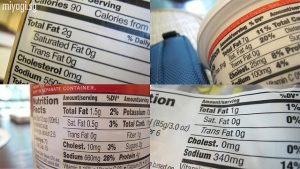Losing The Fear Of Fat: Know Which Fats Are Good For You
 Though many of us have come to associate the word “fat” with negative thoughts and feelings, our body needs dietary fat to maintain good health.
Though many of us have come to associate the word “fat” with negative thoughts and feelings, our body needs dietary fat to maintain good health.
Dietary fat is a macro-nutrient found in plants and animals that fuels our body and is necessary for certain physical functions. For instance, some vitamins cannot be processed in the body without fats present to dissolve them.
Dietary Fat Primer
By becoming fat-savvy we can get the dietary fat we need without adding unhealthy fats and unnecessary calories to our diet.
The first step is to knowing “fat” terminology, including which fats are considered beneficial for health and which are not. Once you know which fats are best, the second step is reading food labels to make wise choices. It takes only a few seconds to check a product’s fat content.
Total Fat
Total Fat is an all-inclusive term for dietary fats. The total fat content of a food item includes all the types of fat it contains. A person’s daily total fat intake includes all the dietary fats they have consumed that day.
An individual’s total fat daily allowance should be no more than 25 to 30 percent of the daily calorie intake. For instance, you would limit fat intake to about 44 to 78 grams for a daily diet of 2,000 calories.
Healthy Fats
Monounsaturated Fat. This type of fat is good for our general wellbeing, cardiovascular health, and blood sugar regulation. It is recommended we eat foods containing this heart-healthy fat – while staying within total fat daily allowances.
Polyunsaturated Fat. This kind of fat is found primarily in plant-based foods and oils, and is beneficial for our cardiovascular and overall health. These fats are recommended as part of our total fat daily allowance.
Omega-3 Fatty Acids. We get these healthy fats from eating fatty fish such as salmon or mackerel, and from plant based sources such as flaxseeds, or flax oil. Omega-3s are highly recommended as part of our total fat daily allowance.
Less Healthy and Unhealthy Fats
Saturated Fat. This type of fat is typically from animal products (e.g., meat, poultry, full-fat dairy). Consuming too much saturated fat may increase the risk of type 2 diabetes and cardiovascular disease. Most dietary guidelines recommend limiting the intake of saturated fats to no more than 7 to 10 percent or less of total daily calories.
Trans Fat. This is an unhealthy fat. The fewer grams of trans fat you eat the better. A low amount of trans fat is often listed on food labels as “partially hydrogenated” fat or oil.
Source: Mayo Clinic
Photo credit: / flickr creative commons
 Eating Disorder Self Test. Take the EAT-26 self test to see if you might have eating disorder symptoms that might require professional evaluation. All answers are confidential.
Eating Disorder Self Test. Take the EAT-26 self test to see if you might have eating disorder symptoms that might require professional evaluation. All answers are confidential.